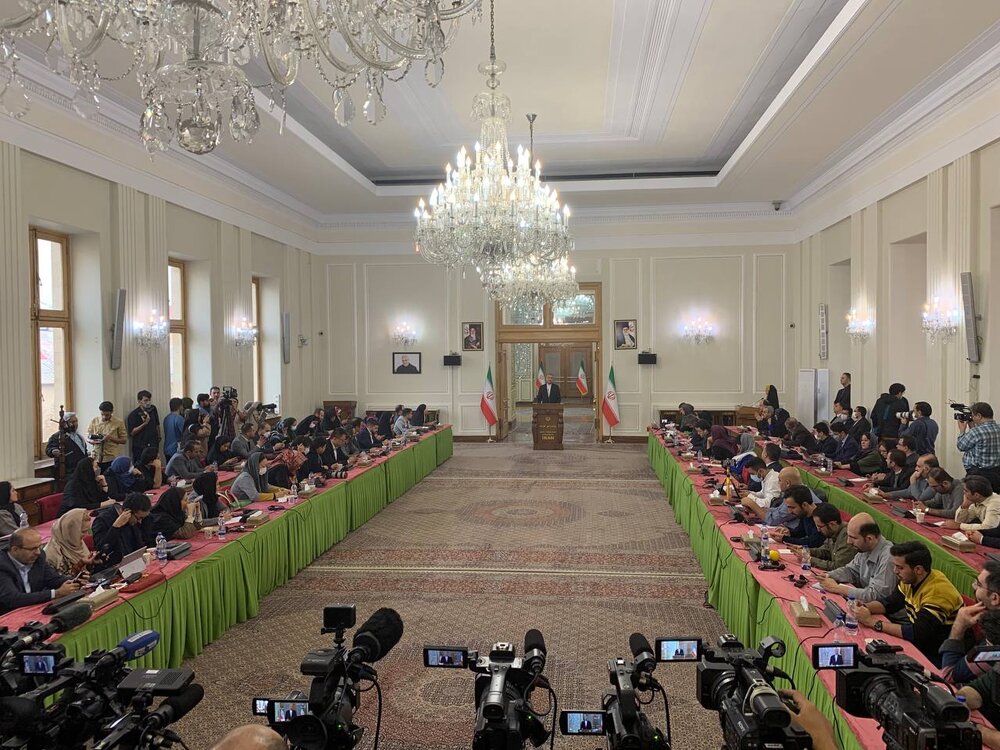Riots never make Iran fall short of nuclear redlines: FM
Amir Abdollahian says Iran and the U.S. continue to exchange messages

TEHRAN- Iranian Foreign Minister Hossein Amir Abdollahian has stressed that Tehran will never back off on its nuclear redlines following the riots in certain cities across the country.
Speaking at a press conference attended by national and international journalists in Tehran on Wednesday, Amir Abdollahian pointed to Iran’s stance surrounding the nuclear talks intended to revive the JCPOA, saying, “The American officials speculated over crossing our nuclear redlines in the light of the recent uprising in Iran but instead they had been told Iran is poised to reaching a durable and stable deal with regards of observing our own redlines.”
Amir Abdollahian also declared that the plot to partition the country and spark terrorism and civil war in recent months had unreservedly failed.
On the basis of "detailed documents" held by the ministry, he said that a scheme to incite terrorism and civil war in Iran and topple the Islamic Republic had failed.
He also denied human rights allegations against Iran by certain Western countries, emphasizing that the West's "dark history" thwarts the crystallization of such accusations.
“We do not need America and Europe, who have a long history of violating human rights and have registered a dark history with regard to exploiting nations and countries, to be claimants of human rights in the Islamic Republic of Iran,” Amir Abdollahian remarked.
He added that the E3 (Germany, France, and the UK), America, and Zionists misunderstood the circumstances and events and made "meddlesome statements."
According to the top diplomat, respecting people's rights and human rights is ingrained in every Iranian's heart and soul as well as in the "religious and national teachings of the Islamic Republic of Iran" and has been repeatedly emphasized by Leader of the Islamic Revolution Ayatollah Seyed Ali Khamenei.
“I made it quite clear to European authorities who profess to support human rights that the Iranian police demonstrated strategic calm and restraint during recent riots.”
He added, “The fact that hundreds more of the defenders of our security were hurt and more than 50 security personnel were slain by rioters using hot and cold weapons shows security forces' respect to human rights and prudence.”
On the recent spike in operations of armed terrorist organizations and mercenaries in the Iraqi Kurdistan region and attempts to transfer weapons into Iran to create mayhem, he asserted "76 terrorist and anti-revolution centers were active” in Iraqi Kurdistan and “American and Israeli weaponry” were trafficked into Iran.
The chief diplomat said “the Iraqi government promised Tehran to keep terrorists away from Iran's borders and disarm these organizations” and “high-ranking security officials from Iran and Iraq met twice over the last eight weeks” for the purpose.
“Our military forces would continue their efforts to achieve maximum national security based on the international law and the United Nations Charter as long as Iran faces threats from its neighbors,” he added.
On the recent IAEA Board of Governors resolution against Iran under pressure by the U.S. and the E3, he said in dealing with Iran the International Atomic Energy Agency had strayed from the technical course in favor of a political approach.
The UN nuclear agency recently met with an Iranian delegation in Vienna, according to the foreign minister, and a "road-map" to settle the unresolved concerns was reached. The agency also agreed to send its specialists to Iran for technical discussions.
The senior diplomat emphasized that "we suddenly confronted a fresh resolution against the Iranian country through a hybrid war."
Iran has previously expressed willingness to hold technical meetings with IAEA specialists to clarify the claims about "undeclared" nuclear installations, which were made based on falsified papers given to the agency by the Israeli regime.
Amir Abdollahian also highlighted that Iran and the United States continue to disagree on crucial topics in efforts to resurrect the JCPOA, and end the draconian sanctions against Iran.
“The three issues that need to be worked out are resolving the remaining concerns with the IAEA, gaining guarantees on the economic advantages of the deal for Iran, and lifting unilateral sanctions,” he said.
Iran and the U.S. continue to exchange messages, as per the foreign minister, but American officials take a "hypocritical" position while speaking to the Western media, stating something different from what they say to Iran.
The foreign minister went on to say that Iran has signaled desire to participate in a ministerial meeting of JCPOA signatories in Vienna provided that other countries are also prepared for such a meeting. “This will happen when we make sure about our reasonable demands.”
The foreign minister also said Ukraine has not provided any documentation to support accusations that Russia used Iranian drones in its conflict with Ukraine.
Amir Abdollahian also said Ukrainian and Iranian delegations involved in political and defense fields convened in a third country and detailed about the situation.
He said that during a phone conversation with his Ukrainian counterpart, he was told Ukraine had shot down a drone looking like an Iranian Shahed 136 drone but was really believed to be Russian.
Leave a Comment